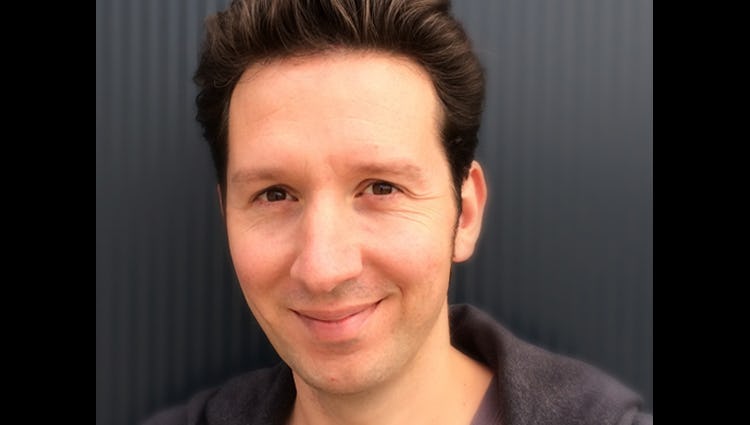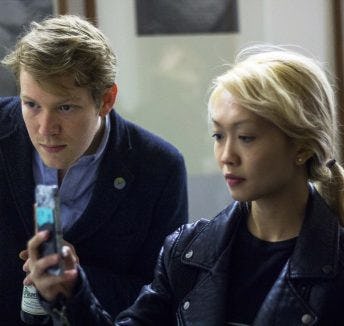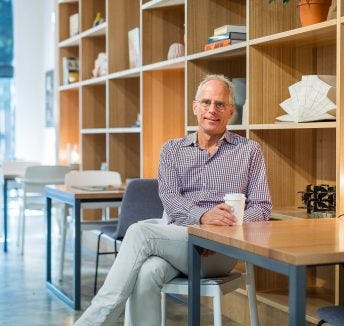
Meet Thomas Timmers, founder of Patient Journey App, the health app connecting doctors to their patients with the right information at the right time. Guest speaking at our next edition of Amsterdam Talks tech, Thomas shares his thoughts on the future of tech in the health industry.
Spaces: Hi Thomas, can you tell us about what you do?
Thomas: At Patient Journey App we focus on delivering the right information to both patients, their friends and their family. We take paper care plans into the 21st century. In short, much research has been undertaken on patient education and engagement. Over and over again it appears that patients just aren’t able to process the large amounts of data, information, and professional insights they receive from the doctor, nurse, and other health care professionals. Still, hospitals keep on overloading patients with more information, through more and more channels like; brochures, pamphlets, websites, information events, Dr. Google, to name but a few.
We put all the relevant information in one device, on one timeline. We deliver it to you by push notification, when you and the people surrounding you, need it most. In this way me make sure that everyone gets the information at a relevant moment, from a single source – ruling out the possibility that someone else has read about your treatment at another hospital with slightly different protocols.
My role within the company is to come up with new ideas, transform requests from the work field into generic functionalities that become available to all users. Since I really love all the work that is being done by health care professionals and find it really inspiring how our body works – it is actually an honour to connect with hospitals and patients every day. I’m also a bit involved in the marketing and sales of the app.
Can you tell us about your background and how it lead you to where you are?
My background is in Economics and Computer Science and Information Science. In the 90’s, I, like many others, started to build websites during my economics study. After finishing the economics thing, I realised I really didn’t want to be in that sector, whereas my fascination for IT grew by the day. Myself and a friend (Floris) started a new study: Computer Science. On our first day we met Paul. Together we started our company: Interactive Studios. This was back in 2003.
Until 2011 we had no connection with health care, until an orthopaedic surgeon, Klaas van der Heijden, from Kliniek Viasana, called me. He got my number from a mutual friend who said “Interactive Studios might be able to build you a custom software solution to gather your PROMS (Patient Reported Outcome Measurements)”. We met the next day and within 10 minutes we understood each other quite well and started the development of this PROMS system. This system, onlinePROMS, is now the leading PROMS system in The Netherlands, gathering PROMS in over 40 hospitals. From the cooperation on the PROMS, Klaas once again called me and said: maybe we should come up with a way to improve patient education.
We started thinking out different approaches and did quite some “photoshopping”. From our own network and Klaas’ his network we were able to test our approach in no time at numerous health care professionals. It directly became clear that we had addressed the right problem – and the solution was an easy to use, implement and maintain app: Patient Journey App.
Within one and a half years we were active at over 20 hospitals in The Netherlands. Currently we have welcomed our first customers from Germany, Belgium, France and the UK. We are talking to hospitals in Italy, Spain and Denmark as well and are teaming up with some of the biggest companies in the medical industry.
What are some of the industry related apps and websites that impress you the most?
I like apps like one drop. Elegant apps that make you do what you should be doing, but create a community vibe because “you are all there together” – sharing information about the results of your blood test, just after eating a burger and a cup of coffee.
How do you harness tech? What role do you see tech playing in your business?
Our whole business is based on tech – it is what we do, what we use, not as a goal but as a facilitator, to create apps that people love to work with, that really solve actual and existing problems.
What are your thoughts on the future of tech and health? Which direction do you see it heading in?
I think that both will only become more intensely engaged – even though I can also see some “cleaning up actions” along the way. Sometimes it just looks like there are too many apps, servicing the same group, but with a slightly different approach. I am sure all of them were put on the marked from a “lets help the patient” perspective, but most of them can’t keep up with the ever changing demands from patients and users, legislation, and techniques, etc.
What companies do you look to for inspiration?
I like companies like 37signals – they have really inspired us with their tools, books, blog, talks, about how to build your company, products, etc. We don’t believe in long term expectations, we solve problems that actually exist, instead of creating them because this new awesome technique would solve the problem. We focus on what clients need, really value their opinion and invest in creating partnerships. We believe in small, elegant solutions that solve one thing at the time. Combined they may solve a bigger problem, but combined they can also really slow each other’s development down.
What are your thoughts on the tech startup scene in Amsterdam?
I think it is great, not just in Amsterdam. In the last few years the tech startup scene has become so vibrant in The Netherlands.
What advice would you give to people aiming to integrate tech as a central component in their business?
To look at tech as a facilitator to solve a problem – not a solution. If any tech components are part of the solution: well great, of course.
What advice would you give others trying to crack this industry?
As previously said, you have to focus on solving an actual problem. Partner up with doctors and patients. Prototype your solution. Show it, over and over again – until you get it right. Make their opinion leading, but never forget why you started to build it in the first place. Keep focus and scope. Saying “yes” to everyone who is involved or “important” will, in the end, leave nothing but a disappointment.
Great, thanks Thomas.
You can listen to Thomas speak about starting up and integrating health and tech in ourAmsterdam Talks Tech VII: The Health Edition.
For a more detailed programme of the evening and to get your tickets, visit our events page here.
Share this article
 Read now FOAM & Spaces Present Helmut Newton: A Retrospective
Read now FOAM & Spaces Present Helmut Newton: A Retrospective
 Read now Re-thinking the space within a space
Read now Re-thinking the space within a space